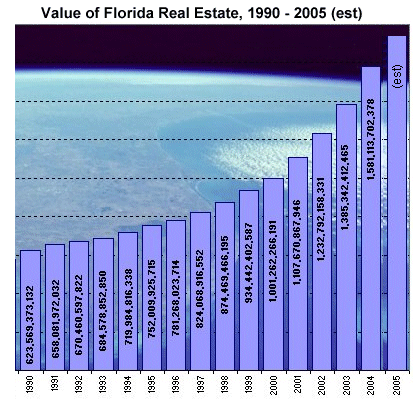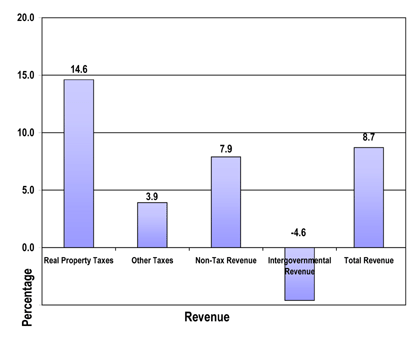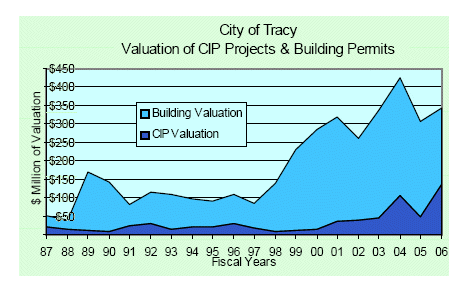

|
| weblog/wEssays archives | home | |
|
Post-Bubble Blues: Derailing the Property Tax Gravy Train (April 6, 2006) 
Following that most venerable political cliche--"Social Security is the third rail of American politics, touch it and you die"--a railway metaphor aptly describes the effect of the housing bubble bursting on local government revenues: derailment. First up is a graph charting the breathtaking ascent of property values in bubblicious locales. Though this chart illustrates Florida real estate's heady climb, all bubble-driven areas share the same characteristics: a rapid rise on property values from the late 90s to the present. Unsurprisingly, property taxes have tagged along for the ride--at least in those states which lack a "Prop 13"-type cap on property tax increases. This second chart reflects the 2005 revenue and spending of a large Northern Virginia suburb of Washington, D.C., one of the frothiest markets outside of California. 
Also unsurprisingly, homeowners are starting to rebel against the sudden leaps in their property tax bills (for example, see this Wall Street Journal story, Texas-Sized Tax Revolt), as local governments are collecting taxes and spending like no tomorrow. Notice how property tax revenue jumped an astounding 14.6% in a single year, enabling the local government to increase spending by 8.7%--more than double the expansion of the U.S. economy (the GDP grew around 3% per year for the past few years). If this doesn't define "impending fiscal train wreck," I don't know what does. Next up we have a chart illustrating the remarkable rise in building permit valuations in a fast-growing Northern California exurb (Tracy).  Though Prop 13 caps the increase in
assessed value of existing properties, it doesn't cap the value of new homes. This chart
reveals the pernicious effect of the housing bubble even in Prop 13-protected locales. Recent
buyers are stuck with sky-high valuations which will never recede until they petition for
a lower assessed value in the post-bubble decline.
Though Prop 13 caps the increase in
assessed value of existing properties, it doesn't cap the value of new homes. This chart
reveals the pernicious effect of the housing bubble even in Prop 13-protected locales. Recent
buyers are stuck with sky-high valuations which will never recede until they petition for
a lower assessed value in the post-bubble decline.
Note how modest the revious real estate bubble in the late 80s looks compared to the present monster bubble. This chart shows just how outsized the current bubble is compared to historic norms. Even with Prop 13 caps in place, note that Tracy's capital improvement projects budget has climbed sharply in the past few years. Some of this is demand-driven, as fast-growing suburbs must build schools, roadways, parks and other improvements to serve the new subdivisions. But what happens when the revenue growth spigot is turned off? According to the Wall Street Journal story: Across the country, the hottest money issue at the state and local level is property taxes. Tax collectors are reaping giant windfalls from the national housing boom, as the average property tax on an American home has climbed to just shy of $3,000 a year. The National Taxpayers Union reports that Texas is one of at least 20 states -- including Arizona, Idaho, New Hampshire, Nevada and South Carolina -- where homeowners are rebelling against soaring assessments that in some cases are taxing people out of their homes. Texas is the epicenter of this backlash, because property tax bills in some localities have doubled in seven years.(Now if only the other states would donate this $25 billion to California, we could clear up our deficits from the past few years!) Given the magnitude of the bubble, the decline in property values will reach similarly epic proportions. What other sources of revenue will state and local governments tap in order to maintain revenues at current levels? Maybe there aren't any. As housing takes the economy down into recession, other revenue sources such as sales taxes and income taxes will also suffer declines. State and local governments will have no choice but to shrink, and shrink as rapidly as their revenues. By willingly hitching their train to the overheated housing bubble engine, state and local governments have unwittingly guaranteed that they will not only share the pain of their constituents, but will actively increase their misery by slashing services and capital improvement budgets. For more on this subject and a wide array of other topics, please visit my weblog. copyright © 2006 Charles Hugh Smith. All rights reserved in all media. I would be honored if you linked this wEssay to your site, or printed a copy for your own use. |
||
| weblog/wEssays | home |